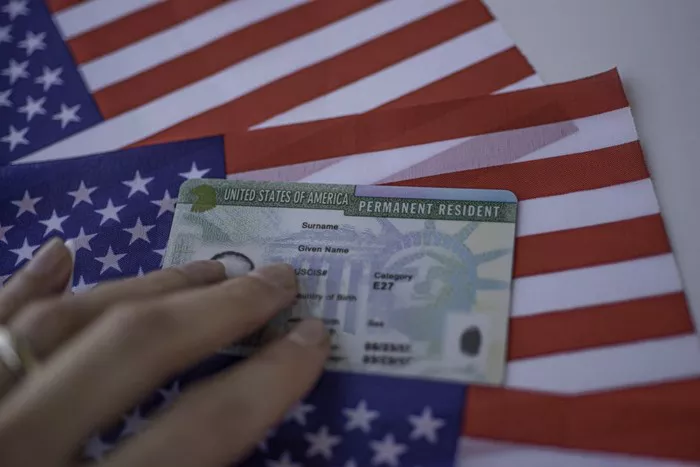The United States is renowned for its diversity and the opportunities it offers to people from all corners of the globe. For many immigrants, obtaining a green card, which grants permanent residency in the U.S., is a crucial step toward achieving their dreams. However, the process of obtaining a green card can be notoriously lengthy and complex. In this article, we will explore the various factors that contribute to the lengthy wait times and shed light on why the green card process takes so long.
1. High Demand and Limited Supply
One of the primary reasons for the lengthy wait times associated with obtaining a green card is the high demand for permanent residency in the United States. Each year, the U.S. government receives a significant number of applications for green cards from individuals seeking to live and work in the country permanently. However, the number of green cards available is limited by annual quotas set by law.
The Immigration and Nationality Act (INA) establishes the annual numerical limits for various categories of immigrants, including family-sponsored, employment-based, and diversity visa immigrants. These quotas are designed to balance the needs of immigrants with the interests of U.S. citizens and lawful permanent residents.
Unfortunately, the demand for green cards often exceeds the available supply, resulting in backlogs and lengthy processing times. This imbalance between supply and demand is a major contributing factor to the delays experienced by green card applicants.
2. Complex Legal Requirements
Obtaining a green card is not a straightforward process; it requires navigating a complex web of legal requirements and procedures. The eligibility criteria for different green card categories can vary widely, depending on factors such as family relationships, employment sponsorship, refugee or asylum status, and diversity visa lottery results.
In addition to meeting the eligibility requirements, applicants must also submit a variety of forms, documents, and supporting evidence to demonstrate their eligibility for a green card. Any errors or omissions in the application can lead to delays or even denials.
Furthermore, the legal landscape surrounding immigration is constantly evolving, with changes in immigration laws, regulations, and policies occurring regularly. Keeping up with these changes and understanding how they may impact the green card process can be challenging for applicants and their representatives.
3. Backlogs and Processing Delays
Even after submitting a complete and accurate green card application, applicants may still face significant delays due to backlogs and processing times. The sheer volume of applications received by U.S. Citizenship and Immigration Services (USCIS) and the Department of State can overwhelm the agencies responsible for processing them, leading to delays in adjudicating cases.
Backlogs can also be exacerbated by factors such as staffing shortages, budget constraints, and administrative inefficiencies within the immigration system. As a result, applicants may find themselves waiting months or even years for a decision on their green card application.
Moreover, certain green card categories may have longer wait times than others due to annual quotas and per-country limits. For example, employment-based green card applicants from countries with high levels of demand, such as India and China, may face significantly longer wait times compared to applicants from other countries.
4. Security and Background Checks
The security and integrity of the U.S. immigration system are of paramount importance, and as such, all green card applicants are subject to thorough security and background checks. These checks are designed to identify individuals who may pose a security risk or who are otherwise ineligible for permanent residency in the United States.
While these checks are essential for safeguarding national security, they can also contribute to delays in the green card process. The extensive vetting process involves screening applicants against various law enforcement and intelligence databases, as well as conducting interviews and investigations as needed.
In some cases, security and background checks may uncover information that requires further review or clarification, leading to additional delays in processing. While USCIS and other agencies strive to complete these checks as quickly and efficiently as possible, the rigorous nature of the process can result in delays for some applicants.
5. Administrative and Procedural Challenges
Finally, administrative and procedural challenges within the U.S. immigration system can also contribute to delays in the green card process. These challenges may include errors or inconsistencies in application processing, miscommunication between agencies, and delays in scheduling interviews or appointments.
Additionally, changes in policy or procedures, such as the implementation of new forms or requirements, can create confusion and disrupt the processing of green card applications. Applicants may find themselves having to navigate these changes while their cases are already in progress, further complicating the process.
Furthermore, the COVID-19 pandemic has posed unprecedented challenges for the U.S. immigration system, including office closures, travel restrictions, and disruptions to visa processing. These factors have added another layer of complexity to an already cumbersome process and have contributed to additional delays for green card applicants.
Conclusion
In conclusion, obtaining a green card in the United States is a complex and time-consuming process that involves navigating numerous legal, administrative, and procedural hurdles. High demand, limited supply, complex legal requirements, backlogs and processing delays, security and background checks, and administrative challenges all contribute to the lengthy wait times experienced by green card applicants. While efforts are underway to streamline the immigration system and reduce processing times, obtaining a green card remains a significant challenge for many immigrants seeking to make the United States their permanent home.


